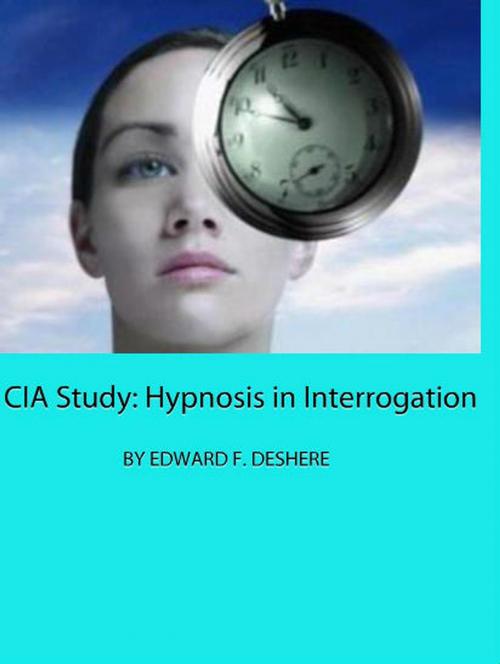CIA Study: Hypnosis in Interrogation
Nonfiction, Religion & Spirituality, New Age, Hypnotism, Health & Well Being, Self Help| Author: | Edward F. Deshere | ISBN: | 9781386188742 |
| Publisher: | Sepharial | Publication: | June 21, 2017 |
| Imprint: | Language: | English |
| Author: | Edward F. Deshere |
| ISBN: | 9781386188742 |
| Publisher: | Sepharial |
| Publication: | June 21, 2017 |
| Imprint: | |
| Language: | English |
The control over a person's behavior ostensibly achieved in hypnosis obviously nominates it for use in the difficult process of interrogation. It is therefore surprising that nobody, as the induction of "Mesmeric trance" has moved from halls of magic into clinics and laboratories, seems to have used it in this way. A search of the professional literature shows at least that no one has chosen to discuss such a use in print, and a fairly extensive inquiry among hypnosis experts from a variety of countries has not turned up anyone who admits to familiarity with applications of the process to interrogation. There is therefore no experimental evidence that can be cited, but it should be possible to reach tentative conclusions about its effectiveness in this field on the basis of theoretical considerations.
The Nature of Hypnosis
Experimental analysis has gradually given us a better understanding of hypnosis since the days of Mesmer (6) and his followers, who held that it results from the flow of a force called animal magnetism from hypnotist to subject. Nevertheless, although no present-day investigator shares the lingering lay opinion that hypnosis is in some way an overpowering of a weak mind by a superior intellect, there are still many divergent theories propounded to account for the accumulating clinical observations. Some of these have significantly different implications with respect to the susceptibility of a hypnotized person to purposeful influence.
The view that hypnosis is a state of artificially induced sleep has been widely held since Braid ( 7) invented the term in mid-nineteenth-century. Currently Pavlov (20) takes a similar position in maintaining that cortical inhibition, sleep, and hypnosis are essentially identical. This view is now held throughout those parts of the world where Pavlovian theory is accepted as creed, but to the American investigator the experimental evidence against it appears overwhelming. Bass, (3) for example, has shown that the patellar -- kneecap -- reflex, which disappears in sleep, is not diminished in hypnosis. Wells (27) and others have demonstrated that all hypnotic phenomena can be elicited in a state bearing no resemblance to sleep, a performance which suggests the hypothesis that sleep-like aspects of hypnosis are not intrinsic to the hypnotic state but result from the hypnotist's suggestion that his subject go to sleep
The control over a person's behavior ostensibly achieved in hypnosis obviously nominates it for use in the difficult process of interrogation. It is therefore surprising that nobody, as the induction of "Mesmeric trance" has moved from halls of magic into clinics and laboratories, seems to have used it in this way. A search of the professional literature shows at least that no one has chosen to discuss such a use in print, and a fairly extensive inquiry among hypnosis experts from a variety of countries has not turned up anyone who admits to familiarity with applications of the process to interrogation. There is therefore no experimental evidence that can be cited, but it should be possible to reach tentative conclusions about its effectiveness in this field on the basis of theoretical considerations.
The Nature of Hypnosis
Experimental analysis has gradually given us a better understanding of hypnosis since the days of Mesmer (6) and his followers, who held that it results from the flow of a force called animal magnetism from hypnotist to subject. Nevertheless, although no present-day investigator shares the lingering lay opinion that hypnosis is in some way an overpowering of a weak mind by a superior intellect, there are still many divergent theories propounded to account for the accumulating clinical observations. Some of these have significantly different implications with respect to the susceptibility of a hypnotized person to purposeful influence.
The view that hypnosis is a state of artificially induced sleep has been widely held since Braid ( 7) invented the term in mid-nineteenth-century. Currently Pavlov (20) takes a similar position in maintaining that cortical inhibition, sleep, and hypnosis are essentially identical. This view is now held throughout those parts of the world where Pavlovian theory is accepted as creed, but to the American investigator the experimental evidence against it appears overwhelming. Bass, (3) for example, has shown that the patellar -- kneecap -- reflex, which disappears in sleep, is not diminished in hypnosis. Wells (27) and others have demonstrated that all hypnotic phenomena can be elicited in a state bearing no resemblance to sleep, a performance which suggests the hypothesis that sleep-like aspects of hypnosis are not intrinsic to the hypnotic state but result from the hypnotist's suggestion that his subject go to sleep















